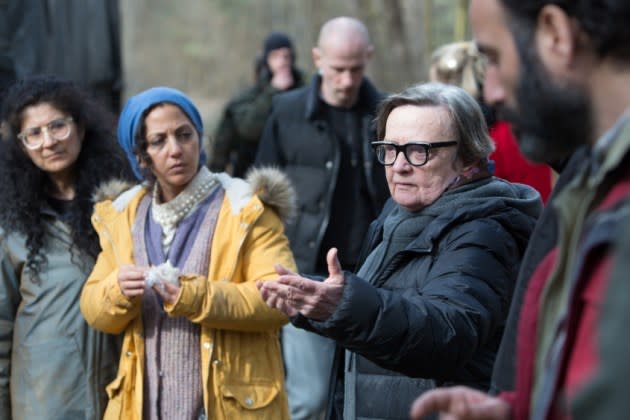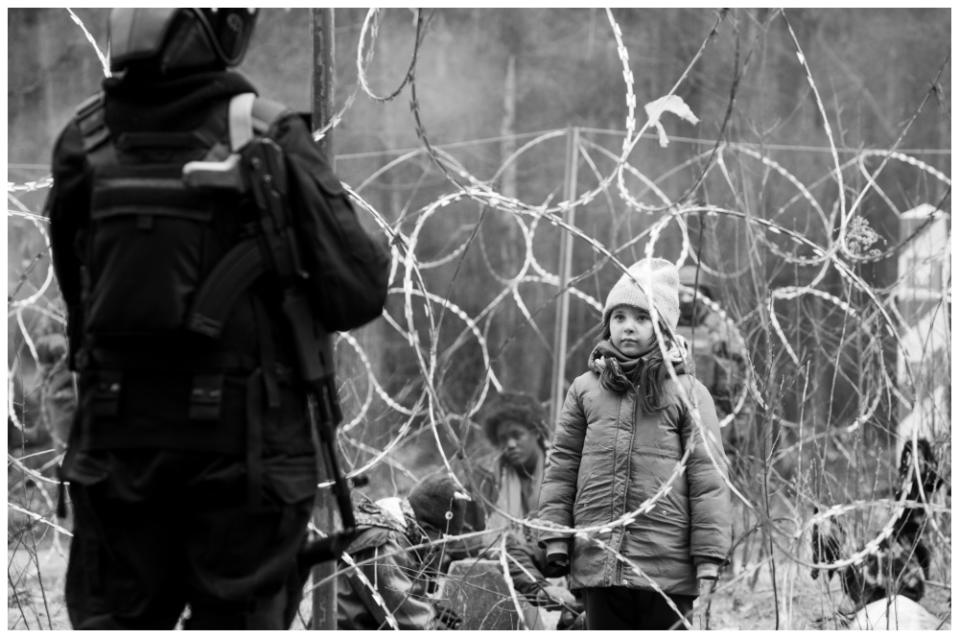Agnieszka Holland Calls Out Polish Minister’s ‘Hate Speech’ Comparing Refugee Drama ‘Green Border’ to Nazi Propaganda (EXCLUSIVE)
- Oops!Something went wrong.Please try again later.
- Oops!Something went wrong.Please try again later.

Three-time Academy Award nominee Agnieszka Holland has called out a hard-right Polish minister who compared her refugee drama “Green Border” to Nazi propaganda, accusing him of “hate speech” and insisting that the Eastern European nation’s right-wing ruling party is “afraid” of her film’s damning portrayal of its response to the refugee crisis. The movie is competing for a Golden Lion at the Venice Film Festival this week.
“We expected that they would be furious. They are afraid of this subject. They know we are telling the truth,” Holland said, speaking from the Venice Film Festival. “They are in denial — cynical denial, in my opinion. And they didn’t think that we would be so vocal about it — that our voice would be heard in many places.”
More from Variety
'Explanation for Everything' Review: A Witty, Multi-Faceted Study of a Manufactured Controversy
Richard Linklater Talks Crafting 'Hit Man' Script With 'Top Gun' Star Glen Powell
Richard Linklater Hands Out High Fives as 'Hit Man' Gets 5-Minute Standing Ovation at Venice
On Monday, Poland’s hard-right justice minister Zbigniew Ziobro wrote on X (formerly known as Twitter): “In the Third Reich, the Germans produced propaganda films showing Poles as bandits and murderers. Today they have Agnieszka Holland for that.”
Speaking exclusively to Variety, the director fought back, characterizing Ziobro’s attack as “defamation” and saying that she’s currently pursuing legal action on the grounds that it constitutes “hate speech.”
“What he said wasn’t even against a film he hasn’t seen; he was talking about myself,” Holland said. “He was saying that the Nazis had Goebbels to make anti-Polish propaganda, and now they have Agnieszka Holland. It was over-the-top, even for that [ruling] party.”
She continued: “To accuse me of being a Nazi, it’s a little indecent. Especially with my personal story, being the grandchild of Holocaust victims, and the daughter of a woman who was a Warsaw Uprising fighter. It’s a little too much.”
“Green Border” is set in the treacherous and swampy forests between Belarus and Poland and focuses on the humanitarian catastrophe that unfolded when Belarus’ president, Alexander Lukashenko, opened the country’s doors to migrants in a cynical political gambit to flood the E.U. with refugees.
Told in chapters from alternating points of view, the film tells the story of a family of Syrian refugees, an English teacher from Afghanistan, a young Polish border guard and a group of activists whose lives collide in the border zone, a desperate no-man’s land where Polish and Belarusian guards operate with brutal impunity.
In a glowing review from Venice, Variety‘s Jessica Kiang described Holland’s “intense, intelligent broadside against frontier injustice and terror” as “a gripping account of the inhumanity and depravity that ensues when those fleeing persecution are made political pawns.”

The director, who fled communist Poland for France in 1981 before the imposition of martial law in the Eastern European country, has been an outspoken critic of the hard-line, anti-migration policies of governments in Poland and elsewhere in Europe. In an impassioned interview with Variety ahead of the premiere of “Green Border,” she spoke about her desire to “give the voice to those who are voiceless,” adding: “I don’t want Europe to abandon all values that Ukrainian soldiers now are fighting for. Human rights. The dignity of every human being. Democracy. Equality. Brotherhood. Solidarity.”
Throughout her career, the three-time Academy Award nominee has returned time and again to what she describes as “the great and tragic subjects of the 20th century” in films including the Holocaust survival drama “In Darkness” — Oscar-nominated for best foreign language film in 2011 — and “Europa, Europa,” which follows the harrowing ordeal of a Jewish teenager who goes to impossible lengths to survive the Holocaust.
With “Green Border” slated for a Sept. 22 release in Poland, Holland said she was unsure it would be safe for her to attend the domestic premiere in light of the justice minister’s rhetoric.
“It is dangerous. It is hate speech. It finds some echo in the fanatic, nationalistic circles, and people will believe I’m really a Nazi and…somebody deranged and fanatic can become dangerous,” she said. “It’s not funny what they’re doing. It’s quite dangerous. It can go out of control.”
On Wednesday, Holland’s colleagues rallied to her support.
“The vile attack on Agnieszka Holland by the Polish Minister of Justice is just another uninformed message of hate from yet another ignorant bigot who has yet to watch the film,” says Mike Downey, a producer on “Green Border” and chairman of the European Film Academy, where Holland serves as president. “In the face of such taunts from the regime, Agnieszka remains boldly and fearlessly courageous — not just as an artist but as a human being. Someone whose complete integrity is an example to us all.”
Pointing to the “huge personal and public attacks” Holland is now facing in Poland, Downey credited the “extraordinary job she does in speaking out against injustice and oppression,” adding: “Staying silent is not an option.”
Poland’s Women in Film Association also released a statement supporting the filmmaker and condemning Polish political and media figures who have “ruthlessly smeared her and her film, ‘Green Border,’ which none of those venom-spitting apparatchiks could have seen.”
The organization called on supporters to sign a protest letter “to make a stand against the hate campaign aimed at Agnieszka Holland and the creators of ‘Green Border,'” noting that “it required tremendous courage, involvement and passion from her and all other creators” to make the film. “This is why they deserve our solidarity and support in the face of increasingly vicious attacks,” the statement added.
Best of Variety
Oscars Predictions: Best Actor - There Will Be Blood in the Lead Actor Race
Everything We Know About 'I Am Legend 2,' Starring Will Smith and Michael B. Jordan
Oscars Predictions: Best Actress - Festivals Declare Emma Stone and Jodie Comer Awards Contenders
Sign up for Variety’s Newsletter. For the latest news, follow us on Facebook, Twitter, and Instagram.

